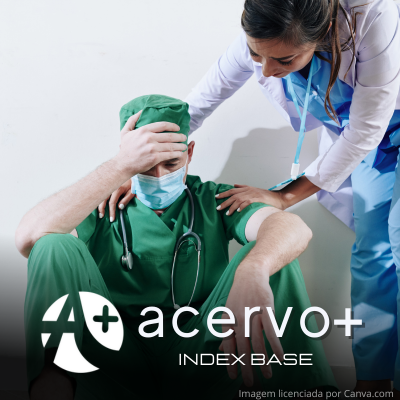Síndrome de Burnout entre cirurgiões
##plugins.themes.bootstrap3.article.main##
Resumo
Objetivo: Identificar na literatura a prevalência da Síndrome de Burnout entre profissionais de diferentes especialidades cirúrgicas, seus principais fatores contribuintes e os diversos impactos dessa síndrome nas esferas pessoais e profissionais. Métodos: Trata-se de uma revisão integrativa da literatura, com artigos da base de dados PubMed, se restringindo a trabalhos publicados entre 2018 e 2023, em inglês ou em português, com texto completo e disponível de forma gratuita. A pesquisa bibliográfica ocorreu em junho de 2023, por meio dos termos MeSh "Burnout, professional" e "Surgeons", combinados com o operador booleano "AND". Resultados: Foram encontrados 296 artigos dos quais, após passarem por critérios de inclusão e exclusão, 7 foram utilizados para a revisão. Considerações finais: Os cirurgiões estão altamente sujeitos à Síndrome de Burnout, experienciando exaustão emocional, redução do nível de realização pessoal e despersonalização. São necessárias medidas para facilitar a sua identificação e combater as causas ambientais e sociais para que sua incidência seja reduzida.
##plugins.themes.bootstrap3.article.details##
Copyright © | Todos os direitos reservados.
A revista detém os direitos autorais exclusivos de publicação deste artigo nos termos da lei 9610/98.
Reprodução parcial
É livre o uso de partes do texto, figuras e questionário do artigo, sendo obrigatória a citação dos autores e revista.
Reprodução total
É expressamente proibida, devendo ser autorizada pela revista.
Referências
2. AL-GHUNAIM TA, et al. Surgeon burnout, impact on patient safety and professionalism: a systematic review and meta-analysis. American Journal of Surgery. 2021; 224(1): S0002-9610(21)007595.
3. BALCH CM, et al. Distress and career satisfaction among 14 surgical specialties, comparing academic and private practice settings. Annals of Surgery. 2011; 254(4): 558-568.
4. BARTHOLOMEW AJ, et al. Meta-analysis of surgeon burnout syndrome and specialty differences. Journal of Surgical Education. 2018; 75(5): 1256-1263.
5. BAUMGARTEN C, et al. Personal and psychosocial factors of burnout: a survey within the French neurosurgical community. PLOS ONE. 2020; 159(50): e0233137.
6. BORGES RMBP, et al. Análise da prevalência da síndrome de burnout em médicos cirurgiões do estado do Amapá, Amazônia, Brasil. Revista Científica Multidisciplinar Núcleo do Conhecimento. 2022; 6: 37-62.
7. CENEVIVA R e SILVA JUNIOR OCE. O paciente cirúrgico - relação médico paciente. Medicina (Ribeirão Preto). 2008; 419(3): 252-258.
8. GALAIYA R, et al. Factors associated with burnout syndrome in surgeons: a systematic review. The Annals of The Royal College of Surgeons of England. 2020; 102(6): 401-407.
9. HUI RWH, et al. Burnout in orthopaedic surgeons: a systematic review. Journal of Clinical Orthopedics and Trauma. 2019; 10: S47-S52.
10. LEBARES CC, et al. Efficacy of Mindfulness-Based Cognitive Training in Surgery. JAMA Network Open. 2019; 2(5): e194108.
11. LESIC ARA, et al. Burnout in Belgrade orthopaedic surgeons and general practitioners: a preliminary report. Acta chirurgica iugoslavica. 2009; 569(2): 53-59.
12. MCABEE JH, et al. Factors associated with career satisfaction and burnout among US neurosurgeons: results of a nationwide survey. Journal of Neurosurgery. 2015; 123(1): 161-173.
13. QURESHI HA, et al. Burnout Phenomenon in U.S. Plastic Surgeons. Plastic and Reconstructive Surgery. 2015; 135(2): 619-626.
14. RIALL TS, et al. Maintaining the fire but avoiding burnout: implementation and evaluation of a resident well-being program. Journal of the American College of Surgeons. 2018; 226(4): 369-379.
15. RIBEIRO RVE, et al. Prevalence of burnout among plastic surgeons and residents in plastic surgery. Plastic and Reconstructive Surgery - Global Open. 2018; 6(8): e1854.
16. RODRIGUES H, et al. Burnout syndrome among medical residents: a systematic review and meta-analysis. PLoS ONE. 2018; 13(11): e0206840.
17. SALLES A, et al. Social Belonging as a predictor of surgical resident well-being and attrition. Journal of Surgical Education. 2019; 76(2): 370-377.
18. SENTURK JC e MELNITCHOUK N. Surgeon burnout: defining, identifying, and addressing the new reality. Clinics in Colon and Rectal Surgery. 2019; 32(6): 407-414.
19. SOARES RS, et al. Burnout e possíveis implicações na qualidade do cuidado. Research, Society and Development. 2012; 10(2): e52810212876-e52810212876.
20. ZAED I, et al. Burnout among neurosurgeons and residents in neurosurgery: a systematic review and meta-analysis of the literature. World Neurosurgery. 2020; 143: e529-e534.
21. ZHENG H, et al. Burnout among Chinese adult reconstructive surgeons: incidence, risk factors, and relationship with intraoperative irritability. The Journal of Arthroplasty. 2018; 33(4): 1253-1257.

